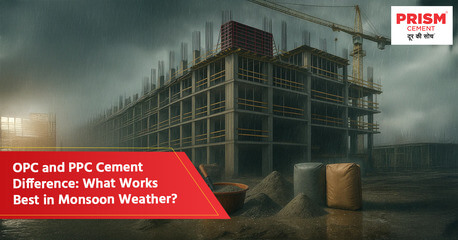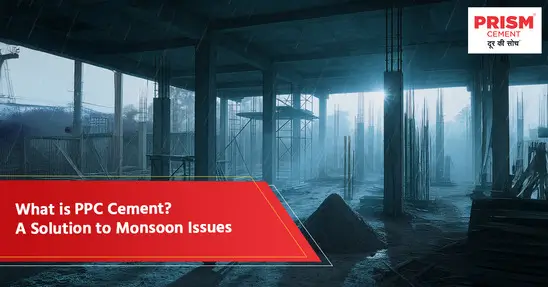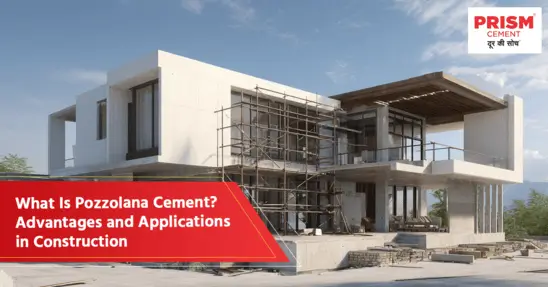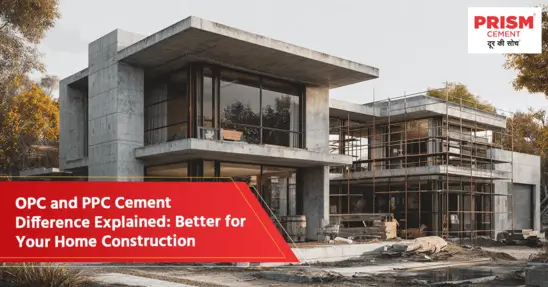When building or renovating your home, choosing the right cement is crucial for ensuring long-lasting durability, especially during the monsoon season. The constant exposure to moisture can significantly affect the strength and integrity of your construction, which is why it’s essential to choose the right cement. In this blog, we will explore the OPC and PPC cement difference and help you decide which one works best for construction during the rainy months.
What is OPC Cement?
OPC (Ordinary Portland Cement) is one of the most widely used types of cement in the world. It’s the go-to choice for most construction projects, including roads, bridges, and residential buildings. OPC cement is known for its high early strength, which makes it suitable for projects that require fast setting time. The cement is made by heating a mixture of limestone and clay to a high temperature, creating clinker, which is then ground into fine powder.
There are three OPC cement types, namely OPC 33, OPC 43, and OPC 53. The number indicates the compressive strength, with OPC 53 offering the highest strength.
What is PPC Cement?
PPC (Portland Pozzolana Cement), on the other hand, is a more advanced version of OPC cement. It is made by blending OPC cement with pozzolanic materials such as fly ash, volcanic ash, or natural pozzolana. The result is a cement that not only provides enhanced strength but also increased resistance to moisture, making it ideal for a variety of construction needs. It is also considered more eco-friendly compared to OPC cement, as it uses industrial by-products in its manufacturing process.
OPC and PPC Cement Difference at a Glance
| Feature | OPC Cement | PPC Cement |
|---|---|---|
| Composition | Made from limestone and clay | Made by blending OPC cement with pozzolanic materials |
| Strength | High early strength, fast setting | Slower strength development, long-term strength improvement |
| Durability | Less resistant to moisture and chemical attacks | Higher resistance to moisture, chemicals, and sulphates |
| Environmental Impact | Higher carbon footprint | Lower carbon footprint due to use of industrial by-products |
| Application | Ideal for projects requiring fast setting and high early strength | Best for structures exposed to water, such as dams, bridges, and buildings in wet climates |
Which Cement Works Best in Monsoon Weather?
During the monsoon season, when moisture levels are high, PPC cement is the ideal choice for construction. This is because it contains pozzolanic materials, which enhance its resistance to moisture, preventing the formation of cracks and seepage. The increased durability also helps prevent corrosion in metal structures, which is crucial when exposed to continuous rain.
On the other hand, while OPC cement offers higher initial strength, it does not perform well in humid conditions. The high permeability of OPC cement makes it more susceptible to water ingress, which can lead to cracks and weakening of the structure over time.
Tips for Using Cement during Monsoon Season
- Cover Construction Sites: During the monsoon, it is essential to protect freshly laid cement from direct exposure to rain. Use tarps or plastic sheets to cover the construction site.
- Use the Right Cement: For monsoon construction, choose PPC cement as it offers better moisture resistance compared to OPC cement. If you must use OPC cement, ensure it is applied during dry spells.
- Proper Curing: After laying the cement, curing is essential for ensuring proper hydration and strength development. Avoid over-wetting during the monsoon, as excess moisture can affect the quality of the cement.
- Check for Leaks: Before starting construction, inspect the area for any potential leaks or dampness, which could weaken the cement over time.
OPC vs PPC Cement: Comparison Table
| Aspect | OPC Cement | PPC Cement |
| Strength | High early strength | Superior long-term strength, especially in damp conditions |
| Water Resistance | Less resistance to water and moisture | High resistance to moisture and seepage |
| Environmental Impact | Higher carbon emissions | More eco-friendly due to the use of industrial by-products |
| Durability | Suitable for dry conditions | Better durability in humid, damp, and coastal areas |
| Ideal for | Quick-setting projects like roads and bridges | Dams, homes, and structures in humid climates or near water |
Conclusion: Choosing the Right Cement for Monsoon
In conclusion, while OPC cement is widely used for its quick-setting properties and initial strength, PPC cement stands out for its long-term durability, especially in humid conditions like those during the monsoon. The use of pozzolanic materials in PPC cement enhances its resistance to moisture, making it a far superior choice for projects in wet climates.
When planning construction during the monsoon, it is recommended to choose PPC cement to ensure the longevity and structural integrity of your building. Prism Cement, with its range of high-quality products, offers PPC cement that is perfect for monsoon construction. It not only provides superior strength but also ensures that your home stays protected from these elements for years to come.
Choose the right cement for your monsoon construction. Go with PPC for lasting strength and water resistance. Get in touch with us for expert advice!
FAQ Section
Q1. Is PPC Cement Better Than OPC in the Rainy Season?
Answer: Yes, it is better than OPC cement in the rainy season due to its moisture resistance and durability, making it ideal for monsoon construction.
Q2. What is Pozzolana Cement and How Does it Help in Monsoon?
Answer: Pozzolana cement, also known as PPC cement, contains natural or industrial pozzolanic materials that enhance its resistance to moisture and water ingress, making it perfect for rainy conditions.
Q3. Can I Use OPC Cement during Monsoon?
Answer: While OPC cement can be used during the monsoon, it is more susceptible to moisture damage. It is recommended to use PPC cement for better durability in wet conditions.
Q4. Why is PPC Cement Recommended for Monsoon Construction?
Answer: It is recommended for monsoon construction due to its superior moisture resistance, which helps prevent cracks and damage from water exposure.
Q5. What is the Main Difference between OPC and PPC Cement in Terms of Durability?
Answer: It offers better long-term durability, especially in humid and wet conditions, due to its moisture-resistant properties, while OPC cement is more prone to water damage over time.




